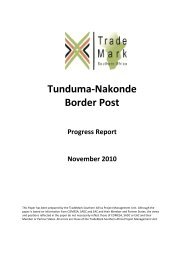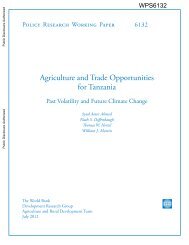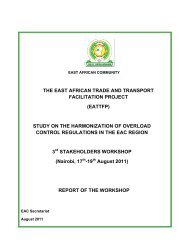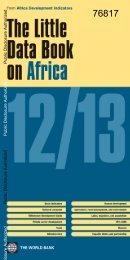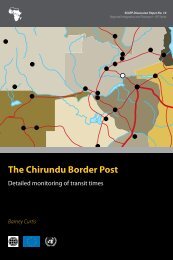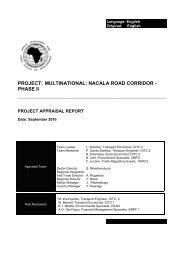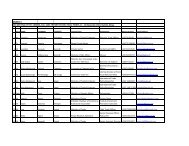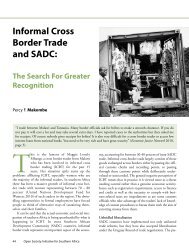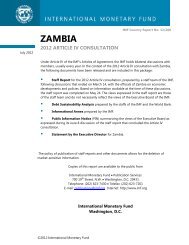Plant Health, Climate Change and Trade - TradeMark Southern Africa
Plant Health, Climate Change and Trade - TradeMark Southern Africa
Plant Health, Climate Change and Trade - TradeMark Southern Africa
Create successful ePaper yourself
Turn your PDF publications into a flip-book with our unique Google optimized e-Paper software.
2 <br />
1. Statement of the issue<br />
Determining adaptive strategies for the Tripartite Region (COMESA, EAC <strong>and</strong> SADC Free<br />
<strong>Trade</strong> Area) to respond to the impact of <strong>Climate</strong> <strong>Change</strong> on the resilience of plant pests <strong>and</strong><br />
diseases that affect <strong>Africa</strong>n agri-business <strong>and</strong> the likely necessity for increased<br />
phytosanitary st<strong>and</strong>ards <strong>and</strong> capacities to combat the spread of new phytosanitary risks.<br />
2. Introduction<br />
The Intergovernmental Panel on <strong>Climate</strong> <strong>Change</strong> (IPCC) states that substantial changes in<br />
average temperatures <strong>and</strong> rainfall will take place as a result of changing <strong>and</strong> intensifying<br />
human activities <strong>and</strong> consumption pattern <strong>and</strong> will increase the frequency <strong>and</strong> magnitude of<br />
extreme weather events. Research on the effects of climate change on agriculture have<br />
mostly focused on the how abiotic factors such as temperature, humidity <strong>and</strong> Co2 levels will<br />
affect crop production but the effects of climate change on biotic factors such as weeds, pest<br />
<strong>and</strong> diseases have not received much attention.<br />
<strong>Climate</strong> change is however, already impacting on phytosanitary systems as recent studies<br />
by the World Bank, the Food <strong>and</strong> Agriculture Organisation (FAO) of the United Nations, the<br />
Consultative Group on International Agricultural Research (CGIAR) <strong>and</strong> others indicate. It is<br />
expected that the impact of climate change on the capacity of phytosanitary systems will<br />
increase in future.<br />
Research studies have been undertaken to determine the effect of climate change on the<br />
prevalence <strong>and</strong> dispersion potential of pests <strong>and</strong> diseases, the increase of new disease<br />
outbreaks <strong>and</strong> the development of adaptive plant health strategies to control risks associated<br />
with trans-boundary pests <strong>and</strong> diseases in developing countries. Studies indicate that the<br />
effect of climate change on phytosanitary risks are likely to be greater in the tropics <strong>and</strong> in<br />
areas of significant water stress in <strong>Africa</strong>. The question to pursue is not whether climate<br />
change will result in new phytosanitary risks but rather what the type, scale <strong>and</strong> tempo of the<br />
changes in phytosanitary risk will be <strong>and</strong> how they will subsequently impact on food security<br />
<strong>and</strong> agricultural trade.<br />
Globalization, population growth, ecosystem diversity <strong>and</strong> resilience, pollution, l<strong>and</strong> <strong>and</strong><br />
water use, atmospheric composition, host-pest interactions <strong>and</strong> changing agricultural trade<br />
patterns are all interdependent <strong>and</strong> interact with climate change as contributing factors to<br />
increase <strong>and</strong> change the occurrence of plant pests <strong>and</strong> diseases that may negatively affect<br />
crop production, market access <strong>and</strong> maintenance. National phytosanitary systems are<br />
therefore continuously challenged to manage the complex <strong>and</strong> changing phytosanitary risks<br />
associated with crop production <strong>and</strong> trade.<br />
Various policies <strong>and</strong> institutions exist that manage phytosanitary problems around the world.<br />
Most policies are developed <strong>and</strong> implemented at national level <strong>and</strong> are based on<br />
international st<strong>and</strong>ards <strong>and</strong> regulations. The International <strong>Plant</strong> Protection Convention<br />
(IPPC) is acknowledged by the World <strong>Trade</strong> Organisation's Agreement on the Application of<br />
Sanitary <strong>and</strong> Phytosanitary Measures (WTO SPS Agreement) as the international st<strong>and</strong>ard<br />
setting organisation plant health. The quality of national SPS policies <strong>and</strong> the capacity of<br />
COP 17 -‐ <strong>Trade</strong>mark <strong>Climate</strong> change impact on phytosanitary risks



